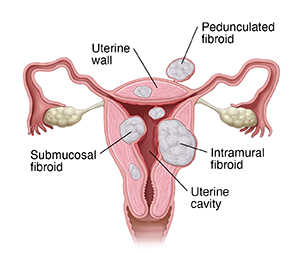What Are Fibroids?
Fibroids are also called myomas or leiomyomas. They are growths that usually form in the wall of your uterus. Fibroids are the most common tumor in women. They are almost always noncancerous (benign) and harmless. Fibroids are made up of connective tissue and muscle cells. They start as pea-sized lumps. But they can grow steadily during your reproductive years. Many fibroids just need to be watched. Others may need treatment if they become too large or cause symptoms.

Possible problems
Fibroids often cause no symptoms. But a fibroid that grows quickly in your uterus can cause one or more of the following problems:
-
Excessive uterine bleeding, leading to a lack of red blood cells (anemia)
-
Frequent urge to urinate
-
Trouble having bowel movements
-
Achiness, heaviness, or fullness
-
Back or belly (abdominal) pain
-
Pain during sex
-
Trouble getting pregnant or being unable to get pregnant
-
Problems during pregnancy
-
Enlargement of the lower abdomen
Treatment is tailored for you
No two fibroids are the same. The type of treatment you will have depends on several things, including:
-
How many fibroids you have, their size, location, and how fast they grow.
-
How severe your symptoms are.
-
If you plan to have children.
There are a growing number of effective ways to treat fibroids. After your medical evaluation, your health care provider will talk with you about the best options to solve your particular problem and meet your needs.
Your future checkups
Treating your fibroids is likely to relieve your symptoms. But your health care provider will want to check your progress. Ask your provider about any other follow-up visits you might need.
© 2000-2025 The StayWell Company, LLC. All rights reserved. This information is not intended as a substitute for professional medical care. Always follow your healthcare professional's instructions.